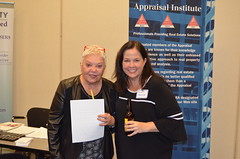Monthly Archives: May 2014
Spring 2014 AARO Conference
On behalf of ICAP, Ken Mrozek, MAI, SRA attended the Association of Regulatory Officials (AARO) 2014 Spring Conference, where discussions included state compliance reviews, national registry, USPAP, Dodd Frank Act, AMC Regulation, mandatory background checks, and more. This year’s spring conference held April 11-13 at the Sir Francis Drake Hotel in San Francisco, California. It was attended by representatives from the TAF, ASC, AQB, APB, ASB, AMCs, Members of the Conference of State Bank Supervisors, AI, IAAO, NAA, IAC, FBI, as well as many state regulator departments (including Brian Weaver ad Mark Thompson from Illinois). Topics of discussion at the conference included:
- Updates from TAF, ASC, AQB, APB and ASB
- Criminal History Reports & Background Checks;
- Reducing Complaint Processing Times: Successful Complaint Reductions Plans & ASC Review Findings
- Mortgage Fraud Investigation
- Supervisor/Trainee Course Development & Maintenance
- Federal Legislation on Background Checks and the February AQB Exposure Draft
- Appraiser and AMC Regulatory Issues and Updates
Additionally, time was allocated to various Advisory Council Meetings, meetings included: ASC Advisory, Qualifications Advisory, USPAP Advisory, AMC Advisory Council, and Appraiser Professional Organizations Advisory Council. The following is a summary of the discussions as presented by the various presenters.
Jim Park, Executive Director of the Appraisal Subcommittee (ASC)
- New State Rating System for State Compliance
The old ASC State Rating system had three ratings: In Substantial Compliance, Not In Substantial Compliance, Not In Compliance. The new rating system, as of June 1, 2013, states have 5 ratings. Eighteen states have been rated so far in 2014 (including Illinois). The rating categories and number of states rated are:
o Excellent (2-year review cycle)/4 States
o Good (2-year review cycle)/8 States
o Needs Improvement (2-year review cycle)/6 States
o Not Satisfactory (1-year review cycle)/ 0 States
o Poor (Continuous Monitoring)/0 States
Illinois was reviewed September 2013 and was rated: Needs Improvement with a 2-Year review cycle with follow-up.
- National Appraiser Registry
There was discussion on how states are keeping the National Appraiser Registry up to date with licensee information. At present, 27% of states are entering all data directly into the National Registry. California is using SOAP System, which is linked to the National Registry and automatically updates the registry daily.
- Appraiser Population
Mr. Park discussed the appraiser population, which peaked in 2008 with approximately 120K appraisers. It had declined at a 3% to 5% annual rate through 2012. He noted that the rate of decline decreased in 2013 to 1%, where we are currently at approximately 100K appraisers. These numbers to not include trainees.
- Dodd Frank Act – Appraisal Complaint National Hotline, Statistics
Since implementation as required by the Dodd Frank Act, the Appraisal Complaint Hotline website has had approximately 6,200 website hits. The call center has taken 287 calls and there were 289 federal referrals and 865 agency referrals.
- AMC Regulation
The AMC Regulation Requirements were released for 60-day Comment Period. The Comment Period ends June 9th. There may be another round of requirement and another 60-day comment period. Once the new requirements are enacted, states will have 36 months to comply (with one possible 12 month extension). The AMC Registration also includes a definition of an AMC, which differs from the current Illinois definition.
- Federal Regulations to Come and ASC 2014 Priorities
Mr. Park discussed additional regulations and other Appraisal Subcommittee priorities that may be seen in the future. These include:
o Interagency guidelines require all valuations to be subject to review. The Appraisal Standards Board is just starting to look at Automated Valuation Modules (AVM’s) and how the board might ensure Quality Control.
o The ASB is looking to develop a Unique Appraiser ID Number that will be tied to the National Appraiser Registry. The number would be used at the state and federal level to identify and track individual appraisers.
o The Dodd Frank Act requires the ASB to develop an AMC National Registry. This is still in progress.
David Bunton, President of The Appraisal Foundation (TAF)
- Investigator Training
TAF developed courses for Investigator training. There were two levels of investigator available and one newly announced training. There are currently 310 Level I Trainers and 204 Level II Trainers. TAF will not be offering a Level III investigator training course which will focus on evaluating appraisal report writing and reporting investigator findings.
- Foundation to Publish a “Digest of USPAP Court Cases”
TAF will publish a collection of court cases across the country which cites USPAP. The volume of court cases citing USPAP has grown exponentially, according to Mr. Bunton. A website subscription will be available in time. There was not timeframe given to when it would be published or when the website would be available.
The foundation has an electronic library available with resources to assist appraisers. Resources highlighted include:
o Training Videos
o AQB Updates
o APB – Its Role and Function
o Understanding the Appraiser Regulatory System
o Introduction to Green Buildings
o Mock Administrative Hearing
o Roundtable – Business Valuation Profession as it Relates to Financial Reporting
Mr. Bunton described a new non-profit organization established with the support of thirteen appraisal-related organizations, known as Alliance for Valuation Education. The alliance’s primary goal is to develop valuation education that broadens and complements those courses currently being offered in the marketplace. The Alliance will not be a provider of education. The education developed by the alliance will be made available for wholesale purchase by education providers and professional organizations who will serve as course presenters. Initial focus of the Alliances is on Continuing Education and may consider development of Basic Qualifying Education Courses or Remedial Courses later.
Wayne Miller, Chair of Appraiser Qualifications Board (AQB)
- Background Checks Mandate
Mr. Miller announced that earlier that day, the Board voted to postpone mandate for background checks to 1/1/2017. States can still implement prior to this date, but after 1/1/2017, states will be required to complete background checks on all new appraiser applicants.
- Personal Property Appraiser Criteria
Mr. Miller stated that the Personal Property Appraiser Criteria have not been updated since 1998. The AQB is working on updating these criteria and there will likely be an Exposure Draft released soon
- Jobs Analysis Survey sent out to appraisers recently
A recent job s analysis survey was sent over 23,000 emails throughout the country. A total of 14.6% completed the entire survey and the board expressed gratitude for all those completing the survey. The results will drive how appraisers are tested in state exams. The initial results from the survey indicate that since 2008, state appraiser exams have been testing the “right” things. The AQB is looking to see how exams could be shortened without losing effectiveness. Mr. Miller also published the success rates for State Exams, nationwide. In 2013, 1st Time Test Taker Pass Rates for Certified Residential was 69% and for Certified General was 54%.
- Other AQB Discussion points
o 466 of 509 USPAP Instructors renewed their instructor’s license this year. There were 24 new instructors.
o The AQB is considering a University Degree Program, where university students would take college courses that would count for college credit as well as Qualifying Education towards their appraiser license.
Barry Shea, Chair of Appraisal Standards Board (ASB)
- The ASB is the largest it has been, currently at 8 members. Members include: 5 Certified Generals, 2 Certified Residential, and 1 Personal Property
- The Second Exposure Draft for 2016-2017 USPAP is out for comment, some changes:
o Definition of “Report”
- Communication of Assignment Results/Drafts
- Standard 3
- Retrospective versus Prospective Value Opinions
- Reasonable Exposure Time
- Statement 9
- Confidentiality & Ethics Rule. This rule as written as a few unintended consequences. As written, an appraiser is unable to show the appraisal report under investigation to their own attorney due. Additionally, the board is considering two confidentially concerns. One, how does the rule apply to clients that are no longer in existence, such as bankrupt banks. Also, how the rule applies to staff members of an appraisal company.
- Courses being worked on by the ASB
o Appraisal Review Courses
o A course providing a more in-depth look at the applications of USPAP (beyond the 7- and 15-hour courses). This would be an optional course which would look at USPAP as it applies to extraordinary circumstances.
Rick Baumgardener, Chair of Appraisal Practices Board (APB)
- Subject Matter Expert (SME) Process
o Mr. Baumgardener discussed the Subject Matter Expert (SME) Process. There is currently a SME pool of approximately 100 experts in various topics. Once a project has been identified, SME’s will define the Scope of Work for the project and the AQB will approve before the project moves forward. This is not meant to be a “How To” guide, but only provide the basic information for appraisers. The current SME project is the Valuation of Green Buildings. There is a Second Exposure Draft – Valuation of Green Buildings: Background & Core Competency out for comment. Future projects will divide Valuation of Green Buildings into Residential and Non-Residential buildings. The APB is now considering new projects, including:
- Collection and Verification of Sales Comparable Data
- Green Buildings Residential
- Green Buildings Non-Residential
- Tangible and Non-Tangible Assets
- Valuation of Financial Reporting
Criminal History Reports and Background Checks – Defensible Decisions
- Anne Petit, Superintendent of the Ohio State Division of Real Estate & Professional Licensing discussed Defensible Decisions in Administrative Regulation. Ohio has been completing Background Checks on appraiser applicants for some time. She covered the ethical and legal concerns related to implementation. Denials are appealable, but the applicant must appeal to the state board.
- Alec Stone, Legal Counsel for California Bureau of Real Estate Appraisers stated that California statute now requires all new applicants to pass a background check. It is not yet clear if upgrades are required to pass a background check. Mr. Stone stated that 15% to 30% of initial applicants have a “rap” sheet, and over half of these are related to DUI’s. Less than 5% of offences are related to drug felonies or sexual misconduct, and less than 1% is related to fraud.
NMLS System (National Multiple Licensing Services)
- Tim Doyle, Senior VP, Conference of State Bank Supervisors discussed the NMLS System. It is available to State Regulators as a method to track their Appraiser licensees. It tracks pertinent data, including licenses, education, and discipline. It is also compliant with 2017 background check requirement. The systems are an approved channel for the FBI national database, required for proper background checks. Submitted background checks are received back in 2 to 12 hours.
Panel Discussion: Reducing Compliant Processing Times: Successful Complaint Reductions Plans and ASC Review Findings
- Panel:
o Mark Mrnak, Enforcement Director, Texas
o Danitra Kourkounakis, Enforcement Chief, Ohio
o Elizabeth Seaters, Enforcement Chief, California.
- Brian Weaver, Illinois Appraisal Coordinator asked Mark Mrnak on the panel about “Contingent Dismissals” used in Texas. Mr. Mrnak stated that Contingent Dismissals are successfully used in Texas to avoid formal disciplinary. This is available for 1st time offenders with minor or major deficiencies or 2nd time offenders with minor deficiencies. The offender must agree to the terms of the conditional dismissal. Terms may include courses, mentorship, or written assignments. It is usually a short timeframe for completing terms (~6 months). If offender meets required actions, the offense is dismissed with a warning letter which stays in the record, but it is not reported to ASC or AMC’s. A future offense would still be considered a 1st time offense. There are consequences if the terms are not met. The mentorship program includes board approved mentors and the offenders must pay for the mentor’s time. The offender is able to select their own mentor.
- Scott DiBiasio, Appraisal Institute’s Manager of State and Industry Affairs asked panel how states might enforce compliance if appraiser was not required to comply with USPAP, only the USPAP Ethics and Competency Section, for Non-FRT (Federally Regulated Transactions) work. Panel was unsure how to respond, and stated that states require appraisers to be compliant with USPAP. Scott alluded to potential future changes that may require appraisers of Non-FRT appraisals to only comply with the Ethics and Competency Section of USPAP.
Panel Discussion: Supervisor/Trainee Course Development & Maintenance
- Panel:
o John Brenan, The Appraisal Foundation (TAF) – introduced the Supervisory Appraiser/Trainee Appraiser Education Q&A published by The Appraisal Foundation. Worth checking out if you’re a trainee or supervisor. Note: State may add to the requirements beyond the federal requirements.
o Craig Steinley, South Dakota – implementation of a Supervisory/Trainee Appraiser course in South Dakota. Mr. Steinley discussed the implementation of the education in South Dakota. There is a core content section where the AQB provides minimum content. A second portion is the jurisdictional topics related to supervisory and trainee topics specific to the state. AQB allows the states to decide whether the course is considered Continuing Education or not. AQB does not stipulate time requirements. Training has ranged for various states has ranged from around four hours to two days. Illinois course is not yet complete, but is likely going to be a one day 7-hour course for both sections, and likely to be available on the fall of 2014. More to follow.
Panel Discussion: Regulatory Issues: Federal Legislation on Background Checks & the February AQB Exposure Draft
- Panel:
o Tim Doyle (NMLS) – Further discussed NMLS as a possible method for meeting background check compliance through the NMLS system. Noted: NMLS is owned by the Office of Comptroller and is a Not-for-Profit which is owned and regulated by state regulators. Potential future additions to system include: Examination Suite, Risk, Electronic Surety Bonds
o John Brenan (TAF) – Discussed Exposure Draft – 2015 Real Property Appraiser Qualification Criteria as it relates to Background Checks
o Doug Oldmixon (Texas) – Texas considering Background Checks for AMC’s. Also considering statute that would prevent AMC’s from passing on cost to appraiser for excess requirements beyond state requirements.
Panel Discussion: Regulatory Issues: Appraiser and AMC Regulatory Issues and Updates
- Panel:
o Scott DiBiasio, Appraisal Institute – Federal Guidance.
- Mr. DiBiasio discussed risk management guidance. Regulated Institutions are responsible for actions of 3rd Part Entities, such as AMC’s. This has moved more institutions (banks) to bringing AMC functions back in-house. He stated that there are approximately 60% to 80% less residential appraisals ordered through AMC’s currently than in the past year.
- 38 States have passed Comprehensive AMC Oversight & Registration Law and 17 jurisdictions have yet implemented any law. There are many states now looking to update their AMC law. Several states are considering a Recovery Fund versus Surety Bond. Additionally, several states are finding Surety Bonds at $25,000 or less inadequate and increasing to $100,000.
- Some states have added a State Board Member for AMC’s and others have developed an AMC Advisory Board to advise the State Board
- Other Issues being discussed concerning AMC’s are what constitutes an AMC. Dodd Frank Act, which currently relates primarily to residential appraisals, and if/how it relates to commercial appraisals. There is also discussion on what distinctions (if any) should be made between companies with employees versus independent contractors.
- New Proposed Rules for AMC Act were released last week. Mr. DiBiasio offered a checklist he developed to help states analyze if they meet requirements (but stated it is only a working document, not a definitive guide).
ICAP is Featured in The Illinois Appraisers Forum
In order to increase ICAP’s exposure, membership and seminar attendance ICAP is sponsoring the Illinois State Appraisal Forum. See below for a screen shot of ICAP’s Banner:
As the vast majority of visitors to the Illinois Appraisers Forum are Illinois Appraisers ICAP’s banner will be seen by those who would be most interested in attending ICAP’s seminars or joining ICAP as a member.
Register for ICAP’s seminars at ICAP’s homepage ( http://www.icapweb.com ) in the EVENTS box on the right hand side of the page.
ICAP Beginnings
FROM: Michael MaRous, MAI (ICAP’s 1st President)
SUBJECT: ICAP Beginnings
In 1993, the former chapters of the American Institute of Real Estate Appraisers merged with the former Society of Real Estate Appraisers, with officers of Andy Brorsen, Roger TibbIe, Andrew Runge, and Michael Kowalski, and with Michael S. MaRous as President. Illinois state licensing had just been instituted, there was a new State Appraisal Board, and the first appraisal administrator, Larry Bullock, was appointed. There was significant pressure from the real estate brokerage, the mortgage brokerage, the government, and the legal communities regarding input and possible control of real estate appraisal regulations.
The Chicago Chapter of the Appraisal Institute (CCAI) officers directed President Michael MaRous to hire a professional lobbyist to interact with elected state representatives and state senators. The CCAI officers, even though the chapter represented over 1,000 individuals constituted either by designated members or candidates, realized their voice was not large enough or unified enough to have impact on the legislative community. It was clear to the officers that the state legislators wanted to hear only from one voice representing all real estate appraisers in the state of Illinois.
Based on this, in 1993 we reached out to the chapters of the National Association of Independent Fee Appraisers (NAIFA), the American Society of Farm Managers and Rural Appraisers (ASFMRA), and the American Society of Appraisers (ASA), to hold a meeting to discuss the political issues that faced the Chicago chapter of the Appraisal Institute. The meeting was held at the Holiday Inn in Joliet, Illinois, and the agenda that was presented included:
- Appraisal licensing,
- Appraisal regulation,
- Perception and comment from state legislators,
- Relationships with the state appraisal board, and
- Relationships with the state appraisal committee.
The meeting was well attended by all of the invited organizations and a lively discussion ensued. Due to the disparity in the number of members and in the economic strength of the various organizations, the underlying mood and attitudes were positive. All participants realized that unity on the political issues would be in the best interest of all the organizations. Additional meetings were scheduled and held to further explore setting up a unified organization. Significant work had to be done including:
- Starting a simple corporation,
- Employing minimal staff,
- Electing officers and a board,
- Considering a budget,
- Hiring a lobbyist,
- Beginning interface with the state appraisal board, and
- Considering a mission statement.
It was decided that the officers would consist of leadership of the respective organizations. Michael MaRous was elected as the first president; however, the term of the chairs would be limited. Roger TibbIe stepped forward to lead the first meeting with legal counsel and working on by-laws and incorporation, which was critical to the proper incorporation of the organization. It was quickly determined that L.A. Anderson and Donna Hungerford would be the key staff, the position which L.A. has held to this day.
A protocol was initiated for regular board meetings and the various responsibilities of the officers and the board members were determined. We were able to travel to Springfield and to meet with state legislators, to set up a regular attendance at the Governor’s annual golf outing, and to utilize our lobbyist to support our positions and to convey our opinions to the state legislators. The forming of ICAP was well received by legislators and gave us an immediate voice in participating in the rewrites of the state appraisal legislation, which was extremely important due to the size and strength of NAR, National Association of Realtors, which wanted more input and control, not necessarily to the benefit of the appraisal community.
The first year passed quickly and set a good tone for the future. Don Cochran of the American Society of Farm Managers and Rural Appraisers became president for the following 2 years. Brad Ellis followed, with Pat Alesandrini being the last member of the original officers to become the lCAP president. These gentlemen did an excellent job of continuing to fulfill the ICAP mission, to advance the lCAP goals, to create and improve communication with state legislators, and to be the representative for political action for appraisers in the state of Illinois.
We were fortunate that the CCAI had a relatively sound financial position and prepaid The ICAP membership dues of each of the CCAI members for many years. Larry Bullock was a very fair and outstanding appraisal administrator and was very supportive of ICAP. The idea of sponsoring a seminar with lCAP representatives for continuing education was well received by the appraisal community and provided significant financial support to ICAP. It is interesting to note that one of the original attendees and strong supporters of ICAP was Brian Weaver, our current appraisal administrator. Brian provided insight and was a very important member of early ICAP.
Michael MaRous, MAI (ICAP’s 1st President)














